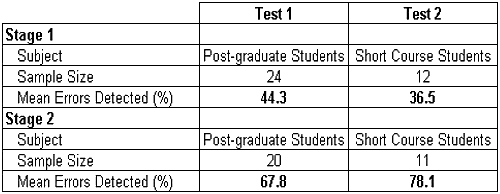Authors
Kamalasen Rajalingham, David Chadwick, & Brian Knight
Abstract
This paper presents the results of an empirical evaluation of the quality of a structured methodology for the development of spreadsheet models, proposed in numerous previous papers by Rajalingham K, Knight B and Chadwick D et al. This paper also describes an improved version of their methodology, supported by appropriate examples.
The principal objective of a structured and disciplined methodology for the construction of spreadsheet models is to reduce the occurrence of user-generated errors in the models. The evaluation of the effectiveness of the methodology has been carried out based on a number of real-life experiments.
The results of these experiments demonstrate the methodology's potential for improved integrity control and enhanced comprehensibility of spreadsheet models.
Sample

This experiment was carried out in two stages and involved a total of 44 post-graduate students and 23 short course students.
The task of the 4 groups of participants was to detect a total of 10 errors that had been seeded into the spreadsheet model.
The participants found significantly more errors when using the proposed methodology in the second stage of the experiment.
Publication
2006, EuSpRIG
Full article
An evaluation of a structured spreadsheet development methodology
